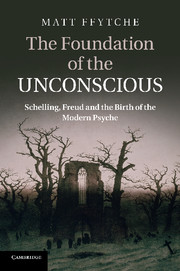Book contents
Conclusion
Published online by Cambridge University Press: 05 December 2011
Summary
While psychology always denotes some bondage of the individual, it also presupposes freedom in the sense of a certain self-sufficiency and autonomy of the individual.
Freud released us all to be continually mysterious to ourselves and others.
My goal in this book has not been, like Schelling’s, to ground history in unconsciousness, but to give the unconscious a history. The conventional view of Freud is that he overturned the theory of selfhood, so that the I is no longer master in its own house; but this gesture had already been made many times throughout the nineteenth century, at the very least by Schelling, Schopenhauer, Carus and von Hartmann. For Schelling and Carus this ‘overturning’ of consciousness, self or I paradoxically served the purpose of preserving the notional autonomy of the individual. Much of the work of this book has been directed towards shifting our understanding of the unconscious, backwards from the epoch of psychoanalysis, to encompass this earlier history in which the concept is rooted, and its connections to German Romantic and idealist precursors. This has meant tracing the way the unconscious became an increasingly central term, and finally an explicit principle, in the post-Kantian philosophy of the subject. At the same time I have wanted to establish how unconsciousness and its correlates become inscribed more broadly within the early nineteenth-century human sciences, and specifically in the technical descriptions of the psyche in Romantic psychology.
In this account of the movement of the unconscious between philosophy and psychology, from a theory of the subject to a theory of the psyche, it has transpired that the unconscious is both an object of empirical enquiry and a solution to the dilemmas of describing the ontology of the individual. It is ambiguously both part of the experience of selfhood and, theoretically, a way of representing the autonomy of selfhood, a building block within modern theories of human identity. Perhaps for this reason, the drive towards the theorisation of autonomous selves in modern culture has placed an increasing weight of attention on the self’s unconscious interior – ‘our ownmost and most genuine nature’; ‘the inward forces which make [human nature] a living thing’; the ‘heart of our being’.
- Type
- Chapter
- Information
- The Foundation of the UnconsciousSchelling, Freud and the Birth of the Modern Psyche, pp. 274 - 288Publisher: Cambridge University PressPrint publication year: 2011



